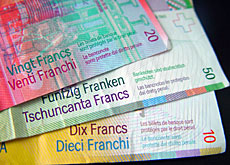Parliamentarian rankled by use of English

A Swiss parliamentarian has called for a ban on the use of English names and words to describe federal offices.
In an open letter to cabinet ministers, Social Democrat Didier Berberat expressed concern that English was taking precedence over Switzerland’s national languages.
He points to the fact that the Swiss Federal Police Office calls itself “fedpol”, while the official producer of Swiss coins is known as “Swissmint”.
“I don’t understand this increasing need to use English,” said Berberat. “Our culture is too rich to ignore.”
The parliamentarian from canton Neuchâtel in French-speaking Switzerland said his letter to the government was more than just a lone crusade against the world’s most spoken language.
He told swissinfo that his aim was to highlight the urgent need to defend Swiss cultural values and ensure that priority is given to the country’s three official languages: French, German and Italian.
The government said it would consider Berberat’s concerns before issuing a formal reply to his letter.
Official languages
Berberat’s complaint centres around the fact that in a country where English is not an official language the use of names and words in French, German and Italian should be a priority.
But he admits that English can also be an advantage when naming federal offices and government agencies.
The Swiss Agency for Therapeutic Products has gone by the name of “Swissmedic” for several years.
“It is easy to have one name that sounds English because no language group feels as though it’s being disadvantaged,” Berberat concedes.
Some parliamentarians argue that the use of English is confusing and that it may not be immediately clear whether Swissmint manufactures coins or sweets.
Berberat adds that English is sometimes used to make federal offices sound more international.
“‘Fedpol’ is only one step away from ‘Federal Bureau of Investigation’,” he said.
The federal authorities have in the past also been criticised for excessive and unnecessary use of English in official documents.
Words such as ‘budgeting’, ‘controlling’, ‘reporting’, ‘newsletter’ and ‘taskforce’ are commonplace, even though most have equivalents in the country’s national languages.
Defending minorities
More than 80 parliamentarians have endorsed Berberat’s campaign against the use of English.
He said that most of his supporters were fellow politicians from the French-speaking part of the country.
“As a minority in Switzerland, people who speak French are not very well represented within the administration, and I understand that our German-speaking counterparts may feel less concerned about this issue.”
“But I feel the government should adhere to the constitution and promote the use of our national languages, rather than that of English,” he added.
Berberat said he was not calling for the introduction of laws similar to those in France and the Canadian province of Quebec which make the use of French compulsory for official purposes.
“If it helps our government departments when dealing with their counterparts abroad, I see no reason to ban English names for international use.”
swissinfo, Scott Capper
Switzerland has four national languages: German, French, Italian and Romansh.
The first three are also considered official languages.
64% of the population speak German, 20% speak French, 6.6% Italian and 0.5% Romansh.
All other languages, including English, represent a total of less than 10%.

In compliance with the JTI standards
More: SWI swissinfo.ch certified by the Journalism Trust Initiative













You can find an overview of ongoing debates with our journalists here . Please join us!
If you want to start a conversation about a topic raised in this article or want to report factual errors, email us at english@swissinfo.ch.